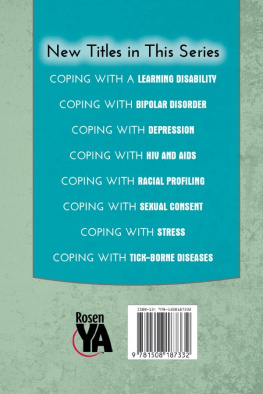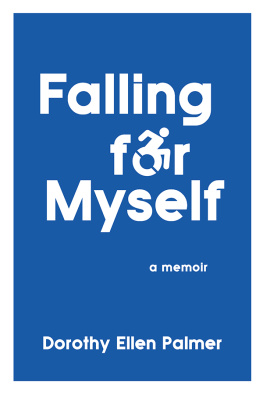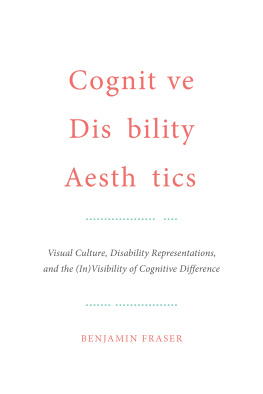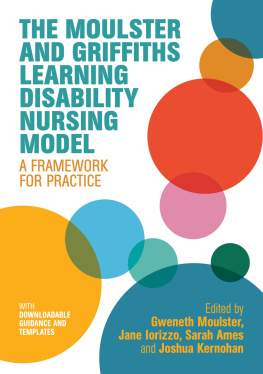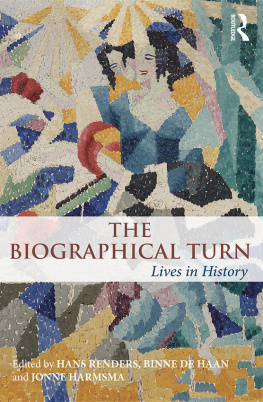For Bert, Bill, George, Edna
Margaret, Albert, John, Denzil and Brian
An Auto/Biographical Approach to Learning Disability Research
DOROTHY ATKINSON
School of Health and Social Welfare
The Open University
Walton Hall
Milton Keynes
First published 1997 by Ashgate Publishing
Reissued 2018 by Routledge
2 Park Square, Milton Park, Abingdon, Oxon, OX14 4RN
711 Third Avenue, New York, NY 10017
Routledge is an imprint of the Taylor & Francis Group, an informa business
Copyright Dorothy Atkinson 1997
All rights reserved. No part of this book may be reprinted or reproduced or utilised in any form or by any electronic, mechanical, or other means, now known or hereafter invented, including photocopying and recording, or in any information storage or retrieval system, without permission in writing from the publishers.
Notice:
Product or corporate names may be trademarks or registered trademarks, and are used only for identification and explanation without intent to infringe.
Publishers Note
The publisher has gone to great lengths to ensure the quality of this reprint but points out that some imperfections in the original copies may be apparent.
Disclaimer
The publisher has made every effort to trace copyright holders and welcomes correspondence from those they have been unable to contact.
A Library of Congress record exists under LC control number: 97072080
ISBN 13: 978-1-138-32056-7 (hbk)
ISBN 13: 978-0-429-45320-5 (ebk)
Contents
The preparation of this book has taken place over several stages, including the work involved in the research project which forms the very heart of the story. I wish to thank the many organizations, groups and individuals who have contributed in various ways, and at various stages, in the planning and execution of the research, and in the subsequent preparation and writing of this book.
The research would not have been possible without the support and encouragement of the Open Universitys School of Health and Social Welfare and Bedfordshire Social Services Department. Thanks are due, respectively, to Malcolm Johnson and Gill Brown for their help in getting the research off the ground. The project depended for its success on the goodwill and unstinting enthusiasm of Mo Bates, Janet Brown and Ann Lorman who, at the time, were key staff at the residential home and day centre. My warmest thanks are due to them for helping to keep the project going through organizing transport, offering reassurance, joining in with their own memories, and helping to interpret group members responses.
The project was a success because of the nine people who volunteered to join the history group, and who stayed with it for its two-year lifetime. Very special thanks are due to Bert Angell, Bill Baker, George Coley, Edna Day, Margaret Day, Albert Gaylor, John Rivers, Denzil Smith and Brian Sutcliffe for joining the group and contributing so much to the project and, ultimately, to this book. I am indebted, for my own greater understanding and awareness of how life used to be, to the nine members of the group.
Thanks are due also to the people who supported me throughout the research. In this context I want to thank Ann Brechin and Jan Walmsley for their initial help in devising themes; to Joanna Bornat for her advice on how to do oral history; and to Fiona Williams for sharing ideas on life story work and identity. I am grateful to the members of the Reflective Research Group for listening to my uncertainties and for suggesting how I might deal with them.
The project led to the publication Past Times. Thanks are due to Christine Finch for her work in typing the various drafts, and for devising just the right format for the final version. I also want to thank Wendy Lee for facilitating the private publication of Past Times, and for proof reading the present book.
Several other people have been involved in the preparation and writing of this book, and I want to thank them personally. Many thanks are due to Janet Vango for her excellent typing of various drafts, her patient attention to detail and for her untiring commitment to making history accessible in book form. I also want to thank Ann Brechin, Joanna Bornat, Di Harden and Mark Jackson for taking the time to read the manuscript in draft, and for giving me the encouragement and feedback I needed to revise and improve it. Special thanks are due to Jan Walmsley not only for reading the book, but also for sharing many ideas, conversations and conference papers along the way. My final thanks are to Peter Sharpe for his personal support of the project and for always being there when there were deadlines to be met and time was short.
The silence of centuries
Many things have been claimed on behalf of people with learning disabilities. One claim is that their voices have been lost not just across the years of this century, but throughout all time. There is a sense in which theirs are the ultimate lost voices in terms of autobiographical records (Atkinson and Walmsley, 1995). With little or no recourse to the written word, their voices were seldom if ever heard. Certainly there is, and has been, silence on the part of people with learning disabilities, a silence throughout the centuries.
The silence is pervasive. One consequence is that much lived history, in the form of the personal experiences of people with learning disabilities, has gone unrecorded. There are few individual accounts of peoples lives, and hardly any sense of a shared perspective on history. The history (or histories) of people with learning disabilities, from their point of view, remains largely unwritten. In that sense it is a hidden history. It is hidden not only from the people most centrally concerned but hidden from all of us.
The silence has been filled, of course, by other more influential and powerful voices. As Joanna Ryan observed, What history they do have is not so much theirs as the history of others acting on their behalf or against them (1980, p. 85). Thus there is a history of sorts; a partial account, based on documented evidence. This is a history of landmarks, key events, Acts of Parliament, and the deeds of great men (and, in this case, of women). These accounts do not include the views of people whose lives were touched, changed or even shaped by the events and actions which feature in these formal accounts. These accounts are not, of course, accessible to people with learning disabilities. The formal history of learning disability, just as much as the lived histories of real people, remains hidden from those most centrally concerned.
This book looks at ways and means of recovering (or finding) at least some of those lost voices, and beginning to chart aspects of that hidden history. In so doing, it is hoped that people who are still largely invisible in their local communities (Bornat, 1992) will become visible and known. This is where what I am calling auto/biographical research comes in. This is a convenient umbrella term which includes both biographical research, which seeks to draw out and compile individual biographies or life stories, and oral history, which involves individuals and groups in recounting their lives within an historical context.




